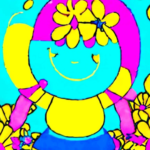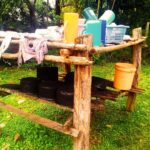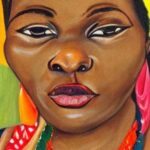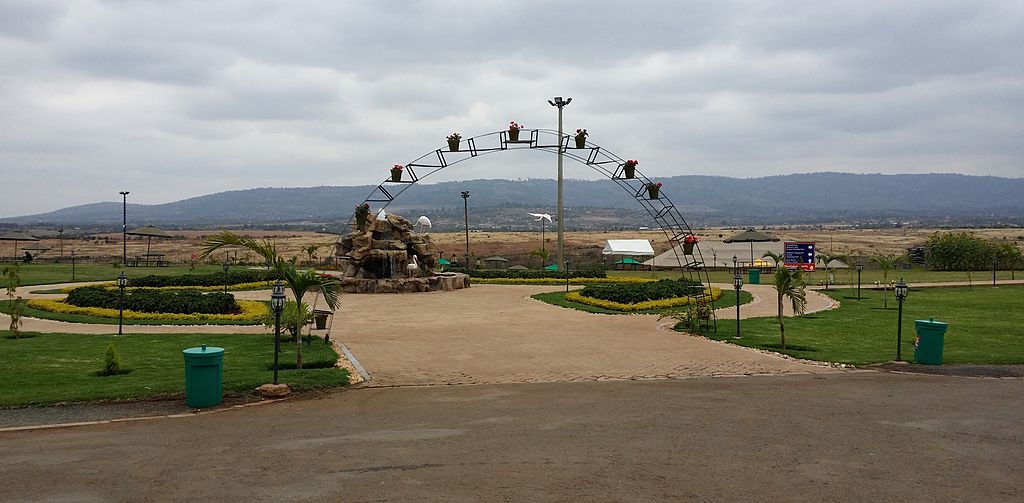My name is Ikine, my teacher in school used to call me Ignatius. I come from a place of kings called Shamberere in Western Kenya. These are the tales from my travels. This is why I will forever remember Ukambani.
I was just there, under a tree in my luuya thinking hard about the days left to an early morning at Kibiego’s. Kibiego the Murakori brewed the best product this side of the Nzoia river and going by the moon, his product was about to ripen. My thirst for kamalwa was unbearable. So much so that it had clouded my thinking: had Kibiego said that the Busaa would be ready by Wednesday? Or was it Thursday?
Then my phone rang. It was our big brother Shitanda. “Mtoto wetu, hatukai vizuri. Nataka ukuje ujue pahali naishi ndiyo kitu ikifanyika..”
Indeed, it was against the spirit of mulembe for brothers not to visit each other, let alone at least know the other’s abode. By the time of the call, a good six months had trickled by since Shitanda had moved to Ukambani for work. In my hearts of hearts, I also silently hoped that he had also found “something for me”.
The Journey To Ubukamba
So the next morning, I was on the earliest Khukhu Luxury Bus that I could find. Under my seat, for our forefathers taught us that it was bad manners to go visiting your kinship in ruguru without a gift, was a kienyeji jogoo from ingo. It was the biggest, proudest itaywa my young cousins could chase down. Somewhere before the sun broke the skies, it crowed “cock-a-doodle-doo”. Poor thing. Between my legs, a gunny bag with my hand tools stood clasped firmly in place. I held on tight to the handle of my tindo half anxious about the 10 hour journey ahead; half pensive because I didn’t want to lose my tools again.
Shitanda had been upset the last time round. He had found “something” only for me to “let the work go” because I has no tools. It was in Kisumo and the following morning, abode the 9 am Prince Bus I bid farewell to Inyanza. I had been deported by Shitanda for being not ready to work. Not this time round. Not this time.
It’s been a week since I made it beyond the hills to the dusty plains. I am yet to sweat over my tools, but I have been out and about. I tell you people of mulembe, some things about Ukambani have thoroughly shaken the Shamberere out of this Kibiego products soaked body and mind.
Greetings In Kikamba
It’s possible that somebody might have said “wimuseo” to me and it making no sense to me, I failed to respond to that person’s greetings. If that happened, then all likelihood was that person went about their business. I emphasize “went on with their business” as in Ukambani, that appears to be the default mode for most people.
I found this quite unlike my people who will be curious to know who is new in the neighborhood; what she or he does; which oluyia they belonged to and if possible, find common relations so that they can start addressing you by your proper title as mulamwa, mukhwasi, baba, mama, kocha, amwavo or wandayase.
After a week there, it occurred to me that maybe we Luhyas are too generous with greetings. Thinking about it, maybe not. For during another short sojourn in Kisumo, I found the children of Ramogi equally chatty and full of mulembe. It is possible, however, that Mukamba is a more reserved people.
Not so Shiatnda assured me after I complained about being starved of greetings. According to him Shamberere had spoiled me. In town, he explained, people mostly stick to their business and observe boundaries.
However, he added, those high walls are brought down once they interacted with you and gained confidence that you are a harmless chap from Shamberere, out to feed your children just as they were. Indeed, the lack of greetings left and right shouldn’t misinform one that Mukamba is a dishonorable person.
More Luhya Folk and Culture
- Agayanzi: The Joyful Baby Girl Name that Embodies Maragoli, Luhya and African Culture

- The one thing a true Luhya home kitchen never lacked

- Thou shall not till! Why in Maragoli culture there was no shamba work following death in the family

- Queen Elizabeth II Dead, Sabeti Lives On…

- Meet The song of the Bukusu circumcision 2022: Enjaka khunywa makalama (Wajackoyah)

- The deep meaning of vuche or vuchee, saying “Good Morning” in Maragoli

Mukamba Are Honorable Men and Women
A caveat first, Mukamba is not dishonorable, but don’t expect a Mukamba to give way in traffic. Brother don’t be fooled with the size of the town. I wouldn’t say that there is road rage in Ukambani, but drivers, cyclists, pedestrians and motorcyclists know of only one direction when their forward gear is engaged. I kind of get it now why Ukambani is the bedrock of such political slogans such as: “Masaa na Ngilu”, “Pita kati kati yao” and “Chap chap”.
That done with, Shitanda in an attempt to orientate me out of the culture shock that I was experiencing insists that a true Mukamba is honorable person. Therefore, when you live with Kamba you must be honorable. They are respecters of people’s space and property. In the six months that he had lived in Ukambani, he had not experienced theft.
Shitanda explained that in many occasions, he had forgotten his shoes outside on the doorstep overnight. In all those occasions he had found them all intact the following day. When you live in Ukambani, ones learns to be honorable. Dishonor, termed locally as “kukanyanga wire”, stepping on a live wire, is discouraged through overt and covert threats of being “remote controlled” by dark powers of “traditional doctors”.
A Different Type Of Remote Control
Thanks to the perchance of a good number of people in Ukambani claiming to have a powerful traditional doctor on speed dial, common wisdom is if you spot a belonging in Ukambani, you shouldn’t tamper with it without the owner’s permission.
Further, the Kamba believe they can send a bad spell to someone who is thousands of kilometers away. Being a big brother, Shitanda acknowledges that we might have heard of places in Mulembe where there’s more potent stuff, however he reminds me not to indulge in that which is alien.
He assures me that he’s telling me all this because of the nature of my work, as it involves short contracts. Therefore, I shouldn’t try funny tricks of shifting goalposts once I had entered into an agreement in Ukambani. That way, he jokes,” the remotes will malfunction from disuse.” We laugh at his characteristic quirky humor.
In Ukambani, Write Off Your Sundays
Could be the ever looming threats of being remote controlled. More likely though, it’s because the land of Mukamba is traversed by the lunatic express. All the same, the streets in Ukambani towns are ghosted on Sundays. The Catholic church, AIC, Salvation Army and the African Brotherhood Church are the common denomination here. The last one abbreviated as ABC got me needlessly excited when I first heard of it. I had mistakenly heard ADC, the African Divine Church, and thus was excited as it was the church of my parents.
Now let me let you in on a small secret, when you live in Kamba-land do all your do’s on Saturday. Save for a few towns with market days on Sunday, most business are closed on the day of the lord.
First Kamba Night Deep In Ukambani For A Brother From Shamaberere
Mukamba loves good times. This last Saturday after catching the game – Shitanda has made a habit of treating one on the the town before laying the gauntlet – we settled in for some Kamba music as a way to sample the nightlife.
That evening there was going to be live band at the local pub, Shitanda announced after catching the game. I was so excited! Who has a better big brother than Shitanda? I wait… Yes! I being one who loves being out on the town, I was thrilled for the opportunity to get to experience a Kamba live band first hand. However, even my enthusiasm could not have prepared me for what I was about to witness and then willingly be part of. Before I tell you about our night, some context first.
Undoubtedly the most spectacular manifestation of traditional Kamba culture was their dancing, performed to throbbing polyrhythmic drum beats. It was characterised by exceptionally acrobatic leaps and somersaults, which flung dancers into the air.
Kamba Music and Dance
The entrance fee to Kamba Night as it as the night at the local had been themed, was a mere Ksh 150. Maybe we were a bit early, but the 150 got us the best seats in the house, just next to the dance floor. Just as the music was getting not loud enough thanks to the sheer numbers of bottles we had popped, (Shitanda and I swallow the frothy as only Luhya men can), I noticed some guys walking bare feet with shoes well tacked into their trouser pockets. At first, I didn’t understand what was going on.
Dancing Barefoot In Ukambani
Allow me educate you people of Shamberere. For one to dance to Kamba music, you must wear fitting shoes with well fastened laces. This is because Kamba music is danced to in a kicking manner. My friends with loafers in their pockets forgot to put on their dancing shoes. Bad mistake.
The therefore had to endure the pain of dancing barefoot, all the while carrying their shoes, lest they san shoes. I don’t know what wives in Ukambani do if one staggers in wasted and shoe-less. However given the extraordinary steps these gentlemen had taken, it shouldn’t be so far off from what their sisters back in Shamberere would have done.
That said, I later came to appreciate these gentlemen with shoes in their pockets as responsible revelers. This was because, going by the vigor of the dancing, their shoes would have inadvertently turned into missiles. Now if you are not able to kick and jump as you dance to Kamba music, one has one last option of clapping their knees. This is usually a style reserved for the climax part of the tune. Remember Kamba music is fast and high pitched. The musicians almost always begin their songs on climax as they taper down.
Mukamba Loves Big Cars: It’s The Toyota Harrier For The Ladies and Toyota Lexus V8 For The Gents
A Kamba lady who has “arrived” drives a Toyota Harrier. A Kamba man who’s got it drives a Toyota Lexus V8. Unlike chisenye and emboko back home, Kamba middle class and royalty have scant taste for German cars or our beloved Toyota Prado.
No Mitumba Here
I mention this not particularly because it says something about Mukamba, but largely because it contrasts so much with Shamberere and what I experienced when by the Inyanza.
Not to say that there aren’t second hand clothes here, but it pales in comparison to the selection and quality back home. What I have noticed however, is that new (read Eastleigh) clothes businesses are booming in Ukambani. The colors are decidedly warm while there are few whites on display. There is one particular jacket that ladies love.
In Ukambani, You Can Watch More Ingwe Games More Than In Western Kenya
This one, I can’t wait for the season to kick off. Shitanda informs me that our beloved Ingwe’s adopted home is just a matatu away at the Machakos stadium.
So Much Yellow In Ukambani
Kyalo, the shopkeeper who I fascinate with my long stories about life in Shamaberere, volunteered the following information when he knew of my musumba status. He says that yellow-yellow Kamba women commonly hail from Kangundo and Kathiani. The ones from Kathiani are particularly 10/10. Their beauty is one thing, their “toughness” is another. The ladies who hail from Kangundo are practically Nairobians in temperament and mannerisms. However, he insists that said good wives are found in Kitui and Makueni.
Direction Nobaa
Traditionally, the Kamba were long distance traders. They walked to Mombasa to buy salt, cowrie shells, steel and spices. Shitanda says that it’s true what they say about asking for directions from Mukamba. When in Ukambani, if it happens that need directions to somewhere, don’t take it lightly when Akamba tells you your destination is just a stone throw away.
They commonly say nobaa meaning just here. What they refer to as just here could mean 30kms radius. In all fairness, the vast Ukambani landscape makes it difficult to estimate distances.
Names
The Mukamba on the street is either a Mwende or Mutiso. However, it is not uncommon in Ukambani for people to introduce themselves by their first names and their parents first names. Thus you are likely to come across a Kamba guy by the name John Martin.
The women are not left out either. For example, you will come across females bearing their first names and first names of their fathers like Lilian David. When you seek to find out why they don’t use their father’s family names, a few have answered that they didn’t like their family names.
In Ukambani, There Are Pumpkins But No Lisebebe And Unga, But No Gorogoro
So one day I ask Kyalo the shopkeeper where I could get vegetables other than kales and cabbages. He goes on to tell me a tale of how early the past month, he had been down with a fever for a few days because he ate green leafy vegetables a couple of days earlier. He therefore cared little for vegetables.
I looked at Kyalo and couldn’t finish him. I begun to suspect that Kyalo had come around to knowing that my tales of Shamberere weren’t entirely true. Thus, with this story of his of fever inducing vegetables, he was serving back what I had been force feeding him on. That was until last Saturday when we scoured the market in search of Luhya traditional vegetables such as lisebebe, miroo and the the likes. Needless to say, a fruitless search it was.
We were however successful in finding dry maize for obusuma. Thank Nyasaye, there was a posho mill in vicinity too. But there was a problem. In Ukambani, they sell dry maize for milling into unga by the kilo. Our beloved gorogoro is an alien concept here. You could have seen how much we sweated with Shitanda trying to find out how many kilos gorogoro kumi equates to.

